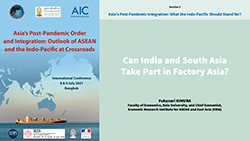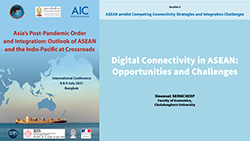
Japan’s Approach to Free and Open Indo-Pacific
Maiko ICHIHARA, Graduate School of Law, Hitotsubashi University, Japan, and visiting scholar at Carnegie Endowment for International Peace
This presentation looks at Japan’s approach to the Free and Open Indo-Pacific vision, and analyzes that Japan promotes liberal values with an incrementalist and pluralistic approach. Japan is uniquely positioned to operate in the diplomatic space between the value-laden approach of Western democracies and (...)
Lire la suite...

Europe Rediscovers the Indo-Pacific… Xi Jinping and Joe Biden
David CAMROUX, SciencesPo, Honorary Research Fellow, Center for International Studies (CERI), Paris
It was the German General K Haushofer, in his Geopolitik des Pazifischen Ozeans (1924) who created the denomination ‘Indo-Pacific’. A century later, in October 2020, the German Foreign Ministry framed its Asia policy guidelines as directed towards an Indo-Pacific region. As is often the case, it was its French counterpart which had (...)
Lire la suite...

Chinese Perspectives of the Indo-Pacific Concept and Major Power Relations
HOO Tiang Boon, RSIS, Singapore
In recent years there have been growing attention on, and increasing usage of, the term “Indo-Pacific” to characterize the political geography of the Asia-Pacific region. While the concept itself is not new and has multiple origins, it gained new levels of prominence when Washington began to evoke the parlance in its policy documents and rhetoric from around 2017. American employment (...)
Lire la suite...

India’s Approach to the Indo-Pacific : Assessing the Critical Shifts in the Post Covid 19 Period
Shankari SUNDARARAMAN, Centre for Indo-Pacific Studies (CIPS), Jawaharlal Nehru University (JNU), New Delhi
The regional balance in the Indo-Pacific has been seeing considerable shifts for nearly two decades with structural changes pushing regional geopolitics to the forefront. Even as the US China rivalry will remain the determining factor for the immediate future of the international order, (...)
Lire la suite...

Prospects for a multi-polarity in ASEAN
Dr. Thomas PARKS, Asia Foundation
The China-US strategic rivalry has galvanized interest in Southeast Asia in ways not seen since the Cold War. However, the rivalry also threatens to bifurcate the ASEAN group of nations should countries be forced into a strategic alignment with superpowers. ASEAN member states have been at the center of great power competition before, but the conditions today are much more conducive for the interests of the region’s (...)
Lire la suite...

Watch the video
Session 4 / Geopolitics in the Indo-Pacific : The Intersecting Interests of Other Major Powers
Chair : Dr. Claire, Thị Liên TRẦN, IRASEC/Univ de Paris
These last 15 years, other great powers have redefined their strategy in the region, replacing the concept of Asia-Pacific to the one of Indo-Pacific. Indeed, the region involves the intersecting interests of two other major powers - Japan and the United States - and significant middle players – Australia and South Korea as (...)
Lire la suite...

Can India and South Asia Take Part in Factory Asia ?
Fukunari KIMURA, Faculty of Economics, Keio University, and Chief Economist, Economic Research Institute for ASEAN and East Asia (ERIA)
The economic context of Indo-Pacific has not well developed yet due to a currently thin economic relationship between ASEAN/East Asia and India/South Asia in the international division of labor. India and South Asia have not participated in the East Asian task-by-task division of labor centered by (...)
Lire la suite...

Asian integration : Post-pandemic realities
Mia MIKIC, Advisor at Large, ARTNeT and Visiting Fellow, Institute for Euro-Asian Studies, Zagreb University
Before the global pandemic, there were several challenges to the Asian trade environment – globalization, weakened multilateral trade regime, diverse participation of Asian economies in the Factory of Asia and sharply increased uncertainty primarily due to trade tensions between the US and China. The pandemic-driven disruptions of supply (...)
Lire la suite...

Asia’s Post-Pandemic DisIntegration ? Dealing with Disruptive Technologies and Divergent Demographics Amid Pandemic Fallout
Jayant MENON, ISEAS – Yusof Ishak Institute
New variants of the coronavirus are producing the worst outbreaks in many countries in the Indo Pacific. Progress with vaccine rollouts has been uneven, further contributing to inequality of outcomes. The pandemic could have lasting effects by reinforcing nationalism, protectionism, and other trends that are already (...)
Lire la suite...

India, ASEAN and the Quad
Amita BATRA, Jawaharlal Nehru University (JNU), New Delhi
The geography of the Indo Pacific remains fluid. The strategic dimension has, however, been developed through the four-member Quad. More significantly, the Quad has, during the pandemic, announced some concrete economic initiatives, specifically for supply chain resilience. These include the SCRI (Supply Chain Resilience Initiative) among three of its members that was announced in September, 2020 and a (...)
Lire la suite...

ASEAN Community Amidst Post-COVID Indo-Pacific Conflict
Piti SRISANGNAM, ASEAN Studies Center, Chulalongkorn University, Bangkok
The year 2021 is when Global Value Chains (GVCs) are at their lowest point. Many believe the GVC will fully recover to the volume of 18 trillion USD again in 2023. International trade advantages through the new trade negotiations is what everyone wants in order to gain the better integration momentum from this GVCs recovery. Unfortunately, the conflict of the (...)
Lire la suite...

Watch the video
Session 5 / Asia’s Post-Pandemic Integration : What the Indo-Pacific Should Stand for ?
Chair : Prof. Suthiphand CHIRATHIVAT, Chulalongkorn University, Bangkok
The session will present and discuss challenging times of Asian integration caused by erosion of global economic order, lingering pandemic crisis and possible recovery, unpredictable trade frictions of major powers, and upcoming regionwide trade agreements of RCEP and CPTPP. The Indo-Pacific has added another (...)
Lire la suite...

Between the Two Seas of Indo-Pacific : From Kra Isthmus to Thai Canal and Landbridge in Southern Thailand
Suthiphand CHIRATHIVAT and Charit TINGSABADH, ASEAN Studies Center, Chulalongkorn University, Bangkok
Recent regional strategic changes have generated an exceptional relooking of two seas’ linkages of Indo-Pacific, in conjunction with the revival of Kra Isthmus in Southern Thailand. The issue is not new as it is the narrowest part of Malay-Thai peninsular and could represent the most (...)
Lire la suite...

Digital Connectivity in ASEAN : Opportunities and Challenges
Sineenat SERMCHEEP, Faculty of Economics, Chulalongkorn University
Digital connectivity is a crucial component for ASEAN’s post-pandemic recovery and competitiveness. During the COVID-19 pandemic, many economies and industrial sectors have accelerated the adoption of digitalization to respond to the pandemic and to mitigate its effect. Improving digital connectivity helps to enhance the regional digital transition. It is also a (...)
Lire la suite...

Cross-Border Electricity Trade and Climate Stabilization : Key Policy, Regulatory and Market Challenges in South and Southeast Asia
Venkatachalam ANBUMOZHI, Economic Research Institute for ASEAN and East Asia (ERIA), Jakarta
Recognising the various benefits of Cross Border Electricity Trade (CBET) for meeting energy security and climate stabilization, both ASEAN and SAARC member states formulated directions. As the political climate is becoming increasing more conducive for CBET, the (...)
Lire la suite...



























